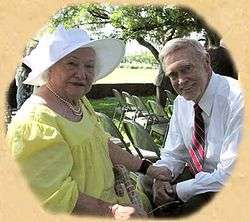Cactus Pryor

Richard "Cactus" Pryor (January 7, 1923 – August 30, 2011) was an American broadcaster and humorist. He received his nickname after the old Cactus Theater on Congress Avenue in Austin, Texas, which was run by his father, "Skinny" Pryor.
Pryor was first heard on Lady Bird Johnson's radio station 590 KLBJ, though his face became as well known as his voice once he moved to television broadcasting on Austin television station KTBC.[1]
In addition to his work in radio and television, Pryor also appeared in two movies, Hellfighters and The Green Berets with John Wayne. He was the author of a 1995 collection of some 40 essays entitled Playback. At KTBC, Pryor had served as programming manager and had hosted a variety of shows. He had conducted interviews with celebrities such as Arthur Godfrey[2] and Dan Blocker[3] and narrated behind-the-scenes programs about KTBC.[4]
As part of his involvement with the Headliners Club of Austin journalists, Pryor starred in satires of television news.[5] He provided the voiceover for the 1960 KTBC film “Target Austin”,[6] which presents the scenario of a nuclear missile strike on Austin.
In 1950, Pryor had a novelty hit on the country music charts with the number 7 "Cry of the Dying Duck in a Thunder-Storm", a parody of Tennessee Ernie Ford's "The Cry of the Wild Goose".[7]
He regaled audiences on Austin radio with a daily 2-minute trip down memory lane, reminiscing about places and people from his past well into the 2000s. He was a self-described liberal, but acknowledged that his children do not share his beliefs. He claimed to have been one of the first people to have heard of the assassination of President John F. Kennedy, having been at the ranch of then-vice president Lyndon Baines Johnson at the time.
Pryor had for several years, been a radio spokesman for the Austin-based Tex-Mex restaurant chain Serrano's. In these ads, he is often called "Nopalito," which loosely means little cactus, after the Spanish word nopal. His broadcasting sign-off consisted of a nonsense word, "thermostrockimortimer," the meaning of which (if any) was never made public. Cactus stated that, "The phrase is in the Bible; if you don't find it, keep reading." "Thermostrockimortimer!" appears on the shared headstone of Cactus Pryor and his wife Peggy in the Texas State Cemetery in Austin.
In 2007, Pryor told his radio audience that he was battling Alzheimer's disease. He died[8] on August 30, 2011 in Austin, Texas, aged 88, weeks after breaking his leg in a fall.
His son, Don Pryor, is co-host of the very popular, "Todd and Don Show" on News Radio KLBJ. Another of Cactus's sons, Paul Pryor, once worked in Austin radio as well.[9]
References
- ↑ "Pieces of the Past". Texas Archive of the Moving Image Curated Collections. Texas Archive of the Moving Image. Retrieved July 21, 2011.
- ↑ "Cactus Pryor Interviews Arthur Godfrey". Wallace and Euna Pryor Collection. Texas Archive of the Moving Image. Retrieved July 21, 2011.
- ↑ "Cactus Pryor Interviews Dan Blocker". Wallace and Euna Pryor Collection. Texas Archive of the Moving Image. Retrieved July 21, 2011.
- ↑ "KTBC Open House, Part 1 - Studio Tour, December 1960". Gordon Wilkison Collection. Texas Archive of the Moving Image. Retrieved July 21, 2011.
- ↑ "Huntley-Brinkley Spoof". Wallace & Euna Pryor Collection. Texas Archive of the Moving Image. Retrieved July 21, 2011.
- ↑ "Target Austin". Texas Department of Public Safety Historical Museum and Research Center Collection. Texas Archive of the Moving Image. Retrieved July 21, 2011.
- ↑ Whitburn, Joel (2008). Hot Country Songs 1944 to 2008. Record Research, Inc. p. 336. ISBN 0-89820-177-2.
- ↑ Gándara, Ricardo. "Cactus Pryor, Austin's original funnyman, dies at 88". Austin American-Statesman. Retrieved August 30, 2011.
- ↑ Boortz, Neal (2008-02-19-07). "Meet the News Team". Clear Channel Communications. Retrieved 2008-02-19. Check date values in:
|date=(help)
4Star 1498. Cactus Pryor. If I Know'd Yousa A Comin' I'd Cut My Throat/Can't Yodel Blues. Issued June 23, 1950.
External links
- Richard "Cactus" Pryor at the Internet Movie Database
- Pieces of the Past, collection of archival footage related to Austin television history, from the Texas Archive of the Moving Image